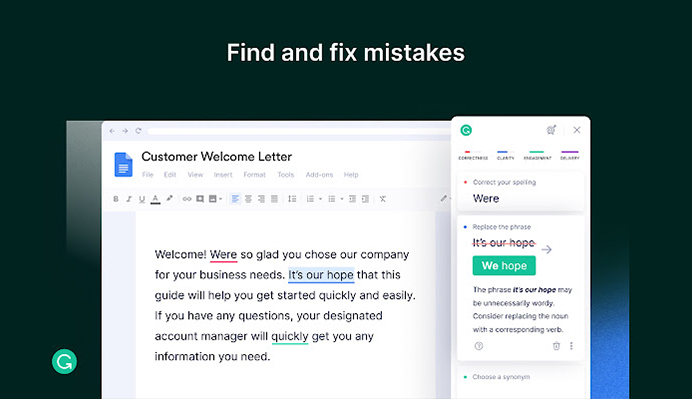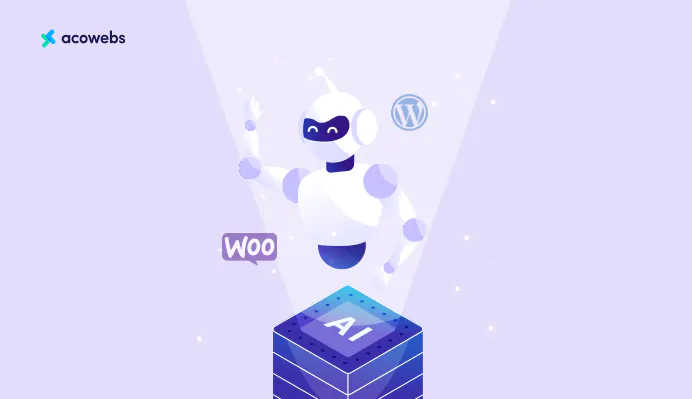In the rapidly evolving digital technology landscape, the convergence of artificial intelligence (AI) with platforms like WordPress and WooCommerce has sparked a transformative paradigm shift.
Gone are the days of mere automation; we now find ourselves at the nexus of a profound symbiotic relationship. AI’s influence resonates throughout personalized website customization, data-driven insights that shape eCommerce strategies, and even how we navigate online content and commerce.
Online shopping has not only gained immense popularity but has also evolved into the standard mode of commerce. Industries traditionally reliant on in-store experiences, such as fashion, are embracing AI to enrich online shopping.
Through intelligent algorithms, businesses leverage AI to enhance user experiences, automate marketing strategies, and derive insights that drive eCommerce growth.
In this exploration of the intersection between AI, WordPress, and WooCommerce, we aim to delve into the retrospective impact of AI on these platforms, unveiling a roadmap that hints at the transformative trajectory that lies ahead.
What Is WordPress?
WordPress is an open-source content management system (CMS) that simplifies the process of creating websites and blogs. It is the most popular platform, powering a significant portion of the internet. Over 43.3% of all websites on the Internet are powered by WordPress.
WordPress allows individuals without coding skills to manage and publish website content with its user-friendly interface. It operates under the GPLv2 license, making it freely available for anyone to use, modify, and distribute.
Below is an example of a WordPress theme future that various eCommerce platforms can utilize. To initiate a WordPress website, you must install a theme (template) that determines how your pages will look and be displayed online.
Themes define design elements, styles, and layouts for your content.

What Is WooCommerce?

WooCommerce is a free, open-source plugin designed for WordPress websites, especially those looking to set up online stores and eCommerce platforms.
It extends WordPress’s capabilities by integrating essential eCommerce features like product showcasing, shopping carts, secure payment processing, inventory management, and order tracking.
This integration empowers businesses and individuals to seamlessly create and manage their online shops within the familiar WordPress environment.
WooCommerce’s journey began in 2011 when developers Mike Jolley and James Koster launched the plugin. They had previously collaborated on a similar eCommerce plugin called Jigoshop. In 2015, Automattic, the parent company of WordPress, acquired both WooCommerce and its sibling plugin, WooThemes.
This union with WordPress significantly accelerated WooCommerce’s development. Presently, Automattic remains at the forefront of WooCommerce’s evolution, driving the plugin to reach greater heights in the world of eCommerce.
Pros of Using WooCommerce
WooCommerce offers a versatile and customizable platform for creating and managing online stores. Why is it preferable?
1. Open-Source
WooCommerce is built on open-source technology, meaning its source code is freely available to anyone who wants to modify and customize it. This high level of flexibility allows developers to tailor their online stores to meet their specific needs.
You can create a unique and personalized eCommerce platform by tweaking the code according to your requirements.
2. WordPress Compatibility
As a WordPress plugin, WooCommerce seamlessly integrates with your existing WordPress website. This compatibility streamlines the process of setting up and managing your online store. If you’re familiar with WordPress, navigating and managing your eCommerce site using WooCommerce is easy.
3. Large Community
WooCommerce has garnered a massive user base and an active community of developers, designers, and users. This community actively contributes to the platform’s development by creating plugins, themes, extensions, and troubleshooting guides.
4. Variety of Themes and Extensions
WooCommerce offers an extensive library of themes and extensions that you can use to customize the appearance and functionality of your online store.
Whether you want to create a minimalist design, an elaborate storefront, or add specific features like product reviews, subscription models, or booking systems, you can find suitable extensions or themes to achieve your goals.
5. Excellent Analytics
WooCommerce provides robust analytics tools that help you gain insights into your store’s performance. You can track key metrics such as sales, conversion rates, customer behavior, and inventory levels.
This data enables you to make informed decisions to optimize your store’s performance, identify trends, and refine your marketing strategies.
6. Scalability
As your business grows, your eCommerce platform must keep up with the increasing demands. WooCommerce is designed with scalability in mind, allowing you to expand your store’s capabilities as needed.
Whether you’re adding more products, experiencing higher traffic, or implementing complex features, WooCommerce can handle these changes with proper optimization.
7. Cost-Effective
WooCommerce is a cost-effective solution for setting up an online store, especially compared to many other eCommerce platforms. While some themes and extensions might have a price tag, the core WooCommerce plugin is free. This makes it an attractive option for small businesses or individuals starting on a budget.
What Is Artificial Intelligence?
Artificial Intelligence (AI) is a field of computer science that aims to develop machines capable of simulating human-like intelligence.
At its core, AI seeks to enable machines to perform tasks that typically require human cognitive abilities, such as learning, reasoning, problem-solving, and decision-making.
The concept of AI has evolved over decades, driven by advancements in technology and the quest to create intelligent machines. AI systems often rely on algorithms and models that process large amounts of data to recognize patterns, make predictions, and draw conclusions.
Machine learning, a subset of AI, involves training algorithms to improve performance over time by learning from data inputs. This learning process enables AI systems to adapt to new information and improve accuracy.
How Will AI Affect WordPress Industry in the Future?
It’s natural to speculate about the effect of AI on WordPress, given its steady presence in the industry. The future outcome remains uncertain, but discernible shifts are emerging, many already underway.
Let’s delve into the anticipated effect of AI on WordPress:
1. Building of Websites
In website building, the emergence of AI-driven algorithms is turning science fiction into reality. Several companies, such as Wix ADI, Hostinger, and Jimdo, are already pioneering the development of algorithms capable of autonomously constructing websites.
An exemplary disruptor in this space is ChatGPT, a creation of OpenAI. This innovative chatbot employs advanced language processing capabilities to generate text based on user inputs.
Its applications span from converting text into code to producing content. ChatGPT and its counterparts offer users access to an AI assistant that collaborates in crafting the ideal website tailored to their specifications.

These AI models can make informed decisions from layout and design to branding. It’s worth noting, however, that these AI-generated websites are relatively simplistic. Web designers and developers remain indispensable, providing services that surpass what AI can achieve.
As the technology evolves, the collaboration between AI and human expertise will likely redefine the boundaries of website development in the future.
2. Customized User Experience
As the capabilities of AI continue to evolve, the potential for delivering highly customized user experiences becomes increasingly evident.
This phenomenon is poised to reshape how customers interact with online platforms, and it holds significant implications for the WordPress ecosystem.
Imagine an AI-powered plugin within the WordPress framework that enables users to upload images of their living spaces.
This AI assistant, equipped with advanced image recognition and interior design algorithms, can analyze the uploaded images to understand the existing decor style, color palette, and furniture layout.
With this information, the AI can provide personalized home decor recommendations seamlessly integrating with the user’s existing setup.
Incorporating such AI-driven tools within the WordPress framework transforms browsing from a generalized activity to an experience that mirrors the expertise of a close friend offering fashion advice.
This interaction minimizes the need for exhaustive searching, as AI seamlessly matches products to individual users. It fosters a realm of hyper-personalization, enhancing user satisfaction and conversion rates.
3. Automated Writing
The effect of AI on WordPress is already manifesting in machine-aided writing, promising to reshape how content creation and writing unfold.
This progression is poised to affect various facets of content generation on WordPress platforms, such as article creation, copywriting for blog posts, and even social media composition.
As the effect of AI on WordPress continues, artificial intelligence capabilities are likely to change many aspects of how publishers and content creators utilize the popular CMS system. Machine learning algorithms and automated insights have the potential to reinvent content strategies.
While AI has not reached the point of producing fully insightful, meaningful, and engaging content entirely on its own, it’s rapidly advancing in that direction. AI’s potential lies in its ability to analyze and incorporate the best content elements without manual human searching.
This doesn’t diminish writers’ skills; rather, it showcases how AI can swiftly research and assemble information that would typically take writers a substantial amount of time to gather from various resources.
It’s important to highlight that human creativity remains a distinctive advantage. AI may excel in rapid research but lacks the nuanced creative intuition writers bring to their work.
Currently, AI-augmented tools like Grammarly demonstrate how technology can enhance writing quality by suggesting corrections and improvements, even understanding context to provide more accurate suggestions.

Further exemplifying the impact, software solutions like Jasper and Writesonic are gaining traction. These tools utilize AI to compose unique articles, craft copywriting, and generate social media content, offering users pre-written content that aligns with their requirements.
Additionally, AI-driven journalism is venturing into providing stock insights, business reports, sports recaps, and more. Interestingly, even WordPress is venturing into AI-powered content writing.
4. Reducing Human Mistakes
AI is pivotal in mitigating human errors within WordPress development and decision-making. In ai coding and security, AI employs machine learning to detect coding patterns, learning from prior mistakes and offering insights that bolster the robustness and security of WordPress code.
Meanwhile, AI’s knack for automating specifications creation aids in precise project definitions by scrutinizing past projects and requirements, curtailing ambiguity and ensuring more consistent outcomes.
In decision-making, AI’s adeptness at processing voluminous datasets expedites the process by considering historical data and performance metrics for well-informed judgments, circumventing protracted human deliberations.
This streamlined decision-making is further fortified by AI’s algorithmic foundation, grounded in predefined criteria and logical patterns that curtail errors stemming from human subjectivity.
A distinctive advantage of AI lies in its continuous learning capacity; AI systems assimilate data and feedback to refine error detection and decision-making prowess over time, fostering algorithmic enhancement.
AI’s multifaceted contributions epitomize error reduction, endowing WordPress development with heightened reliability, security, and efficiency through its analytical acumen and autonomous evolution.
5. SEO Enhancement
Artificial intelligence is substantially boosting SEO efforts in the WordPress ecosystem. Existing AI solutions are already transforming the SEO landscape, and their effect of AI on WordPress continues to evolve.
The days of manually fine-tuning a website’s SEO optimization for WordPress platforms are fading as AI takes a prominent role. Plugins like SmartCrawl are designed to analyze a site built on WordPress, offering recommendations to improve SEO through AI-powered analysis.
These plugins also leverage the potential of social media to enhance SEO on WordPress sites. Moreover, when it comes to optimizing images, tools such as Smush use AI to enhance images for performance on WordPress platforms.
As AI technology advances, the effect of AI on capabilities like SmartCrawl and Smush will also evolve, incorporating more sophisticated techniques to further enhance SEO strategies within the WordPress environment.
6. Unbiased Decision
Humans occasionally make biased judgments because they are motivated by emotions. However, AI is logical, practical, and emotionless when making decisions.
Eliminating prejudicial viewpoints can cause programming to be disrupted by letting agencies decide which sites to construct, what to contain, and which clients to engage with.
How Will AI Affect WooCommerce Industry
Artificial intelligence is poised to change how businesses operate within the WooCommerce ecosystem significantly. As its capabilities continue to advance, the effect of AI on WooCommerce will be wide-ranging.
1. Real-time Customer Support
With an AI-powered chatbot integrated into your WooCommerce website, customers can get immediate assistance 24/7. When a visitor arrives at your online store, the chatbot’s proactive greeting and instant assistance capability ensure that customers’ queries are addressed promptly.
This real-time support enhances the overall shopping experience, boosts customer confidence, encourages engagement, and leads to higher conversion rates.
2. Automated Marketing
AI is streamlining marketing efforts for eCommerce stores built with WooCommerce by automating tasks like tailored email campaigns, retargeting ads, and customer segmentation. By analyzing customer data, AI recognizes consumer preferences and purchase patterns, allowing for precise targeting.
This effect of AI on WooCommerce platforms recognizes individual client profiles and behaviors through sophisticated data analysis. This enables automated marketing communications that are tailored specifically for each recipient.
Such precision targeting has been shown to improve customer engagement and conversion rates. AI-driven personalization ensures consumers better understand customized communications, increasing marketing efficiency and sales for WooCommerce stores.
3. Assisting with the Purchasing Process
Chatbots can guide customers through the purchasing process. If a customer needs help adding items to their cart, applying a discount code, or proceeding to checkout, the chatbot can provide step-by-step instructions. It can also help customers select the right products based on their preferences.
4. Customized Recommendations
AI-powered chatbots can analyze customer browsing and purchase history to offer personalized product recommendations. For example, the chatbot might suggest new skincare items if customers frequently purchase beauty products.
5. Virtual Try-On
For businesses selling fashion or beauty products through WooCommerce stores, AI is enabling innovative virtual try-on experiences directly on the site.
Using consumer device cameras, AI can accurately overlay selected items like clothing or makeup onto a customer’s live image. This allows the user to visualize how the product would look and fit, interactive features that boost confidence in purchasing decisions – especially important for online retailers.
By incorporating these AI-powered virtual try-on tools, WooCommerce merchants are creating a more engaging and personalized shopping experience for customers. This effect of AI on WooCommerce platforms has great potential to drive higher conversions as consumers can virtually “try before they buy.”
6. Inventory Management
AI can predict demand patterns and optimize inventory levels. This prevents overstocking or understocking, reducing storage costs and ensuring products are available when customers need them.
Negative Effect of AI on WordPress and WooCommerce
While AI can bring about many positive effects on WooCommerce and WordPress, there are also potential downsides to consider:
1. Integration Challenges
Integrating advanced AI capabilities into existing WordPress or WooCommerce platforms can present technical challenges, as achieving seamless integration and compatibility with other plugins, themes, and code is complex.
Properly implementing AI solutions is important to maximize the effect of AI on WooCommerce platforms and realize benefits such as improved customer support.
Merchants considering implementing AI on their sites should carefully evaluate any integration requirements to ensure new technologies are properly supported.
2. Costs
Developing and implementing AI solutions can be expensive. Small businesses using WooCommerce may find investing in AI-powered tools or plugins difficult, which could impact how AI will affect WooCommerce sites run by smaller merchants.
Determining how investments in AI will affect sales and customer retention is important for evaluating return on investment.
3. Privacy Concerns
AI technologies often require data for training and optimization, raising important concerns about how customer privacy can be respected when using tools that could affect WooCommerce stores.
Balancing the ability to harness AI’s benefits and maintaining user privacy will be vital as this technology increasingly impacts the eCommerce industry.
4. Technical Challenges
Keeping AI models optimized as new techniques evolve will be critical for merchants evaluating how AI may affect processes on their WooCommerce sites over time. Failure to keep pace could introduce unforeseen issues.
5. Over-Reliance on AI
Excessive dependence on automated AI-driven systems carries the risk of stagnating original human skills. Merchants must thoughtfully consider how AI is implemented to avoid such over-reliance issues that could undermine creative progress.
Conclusion
WordPress stands to be influenced by AI in multiple dimensions. AI is pushing the limits of what is possible in web development, from autonomous website construction to individualized user experiences.
While AI-generated websites are gaining ground, the collaborative effort between AI and human expertise remains vital for crafting exceptional online experiences. Customized user interactions, automated writing, reduced errors, enhanced SEO, and unbiased decision-making are all facets of AI’s effect on WordPress.
In eCommerce, WooCommerce’s integration with AI is revolutionizing customer support, marketing, and shopping experiences. Real-time customer assistance, automated marketing campaigns, AI-guided purchasing, customized product recommendations, and virtual try-on experiences are changing how consumers interact with online stores.
Integrating AI can be complex and costly, potentially creating disparities between businesses. Privacy concerns related to data usage and maintaining AI systems’ technical aspects are essential considerations.
Striking a balance between AI-driven enhancements and nurturing human creativity is also crucial to avoid over-reliance on AI-generated solutions.
Acowebs are the developers of the WooCommerce PDF Invoices and Packing Slips generate PDF invoices automatically and add them to the confirmation emails sent to your customers. We also have developed applications like Email Customizer and Designer For WooCommerce that helps you build and customize WooCommerce emails with a drag-and-drop user interface.












 Login
Login
 Cart
Cart







